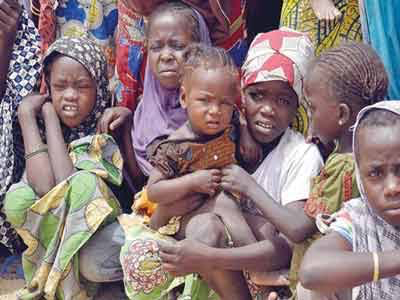THE World Bank has said the number of poor Nigerians is expected to increase from the predicted 90 million to 95.1 million in 2022 due to the effects of the COVID-19 pandemic.
The World Bank said this in its report titled ‘A Better Future for All Nigerians: Nigeria Poverty Assessment 2022’ which analysed some drivers of poverty in Nigeria.
The report noted that sluggish growth, low human capital, labour market weaknesses and exposure to shocks are hindering Nigeria’s poverty reduction drive.

It noted that the number of poor people in Nigeria is set to rise from the 85.2 million predicted in 2020 to 90 million in 2022, due largely to natural population growth.
However, the report added that, due to the pandemic, the number of poor people may skyrocket to 95.1 million.
READ ALSO:
NNPC’s cash-call failures, crude theft, poor environment fingered as oil majors exit Nigeria
Number of poor people in Nigeria to increase by 20 million in next 2 years – World Bank
How N91m intervention project to FMC Owerri is easing viral diseases burden
APC planning to alter Electoral Act to compromise 2023 elections, PDP alleges
Parts of the report said, “The COVID-19 crisis is driving up Nigeria’s poverty rate, pushing more than 5 million additional people into poverty by 2022. With real per capita GDP growth being negative in all sectors in 2020, poverty is projected to have deepened for the current poor, while those households that were just above the poverty line prior to the COVID-19 crisis would be likely to fall into poverty.
“Were the crisis not to have hit (the counterfactual scenario), the poverty headcount rate would be forecast to remain virtually unchanged, with the number of poor people set to rise from 82.9 million in 2018/19 to 85.2 million in 2020 and 90.0 million in 2022, due largely to natural population growth.”
The World Bank encouraged the Nigerian government to prioritise poverty reduction and building out of Nigeria’s fledgling social protection system in order to strengthen public trust in governance, develop administrative reach, and boost resilience.
It also recommended other longer-term pro-poor policy priorities such as using macroeconomic levers to speed Nigeria’s structural economic transformation and the creation of wage jobs; boosting productivity in farm and non-farm household enterprises, for example through investments in human capital, and investing in bedrock infrastructure for inclusive growth.
The report stressed the importance of strengthening public trust in government, adding that a sound implementation of social protection can help build trust and facilitate future crucial policy steps like reduction or removal of fuel subsidies.
The World Bank equally called for new strategies for regular data collection and use, including in conflict-affected areas.
Nurudeen Akewushola is an investigative reporter and fact-checker with The ICIR. He believes courageous in-depth investigative reporting is the key to social justice, accountability and good governance in society. You can reach him via nyahaya@icirnigeria.org and @NurudeenAkewus1 on Twitter.




















